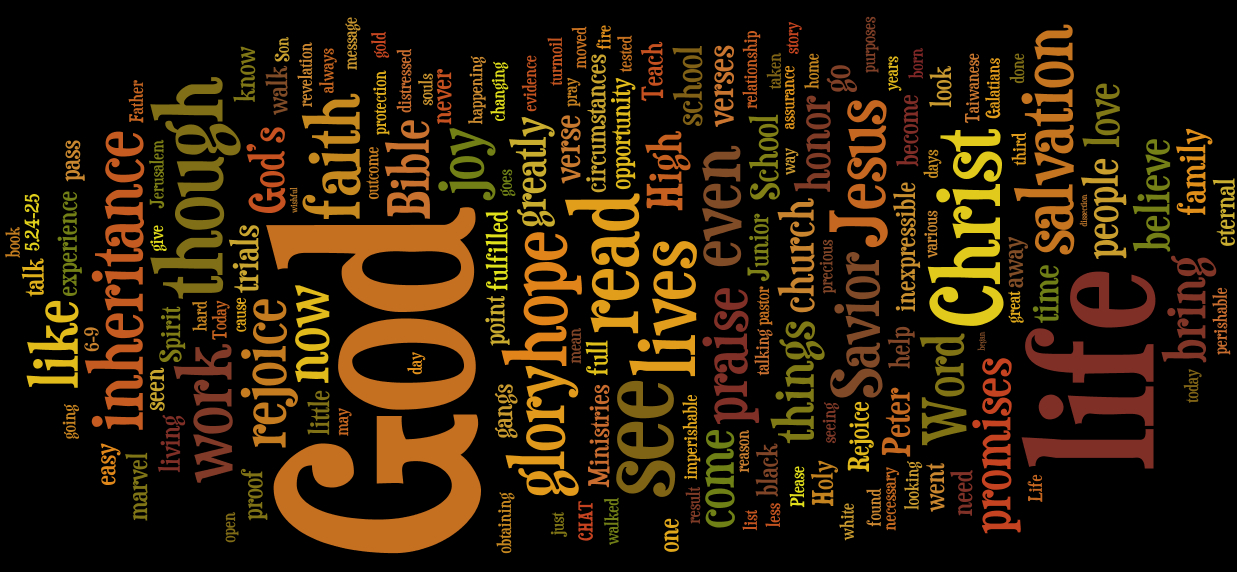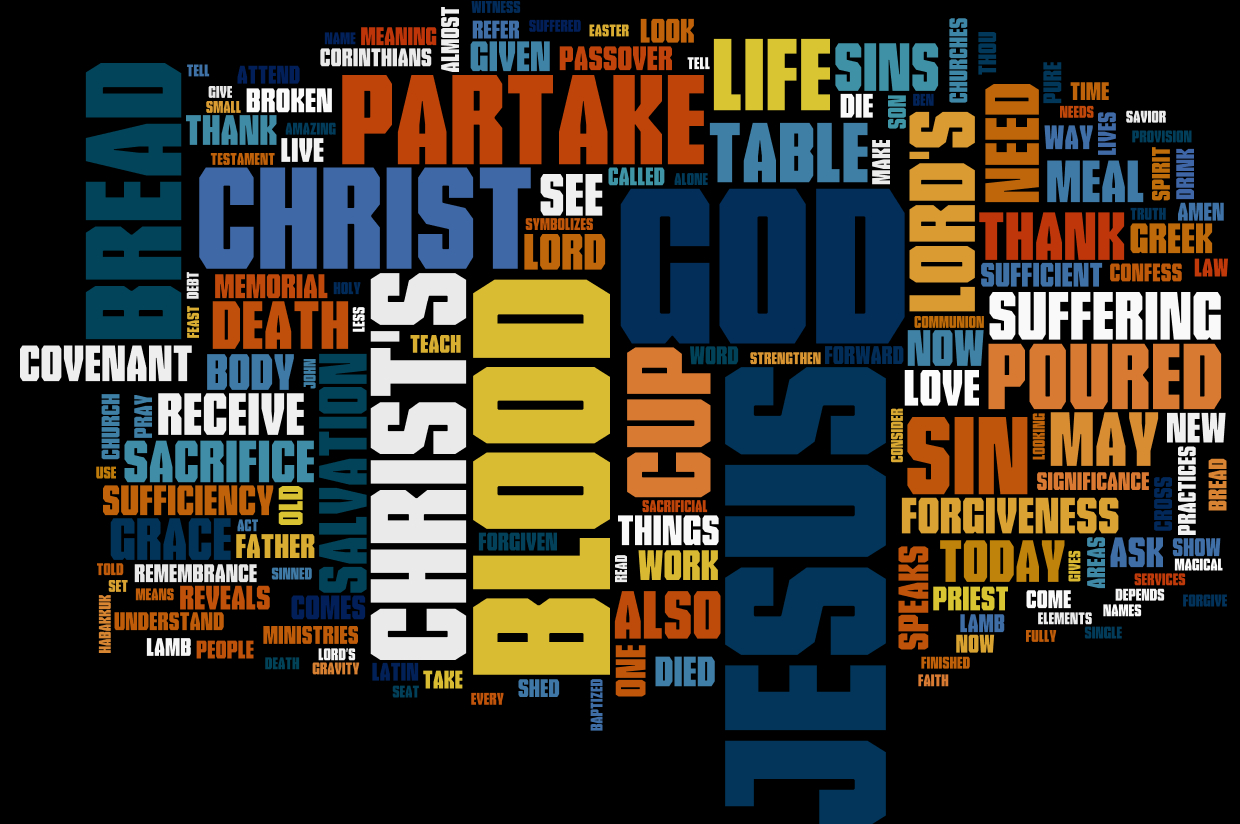| Christian Growth | ||
| June 27, 2004 | Sermon by DRW | Passage Philippians 1.1-11 |
Father,
I pray that you would allow us to see our growth in You. Be blessed as we come to understand better our identity, our growth, and our goal as Christians. Enable us this day to be changed by Your Spirit to reflect in a greater way Your Son that our lives may glorify, praise, and honor You. Teach us this day the wonderful truths contained in Your Word. Amen.
Would you please turn to Philippians 1.1-11.
Before we begin, let’s recall a little background to the passage we are about to study. By the way, when I first began at EFCC, this is the book the high school went through in our Wednesday Bible studies. Paul is writing to a church that owed its very existence to his ministry. It was his preaching that had opened the heart of Lydia to respond to the gospel. He had gone through flogging and imprisonment. His testimony had converted the jailer and his family. It was Paul who had strengthened and encouraged the young, new church. You can read about it in Acts 16.
And now Paul is is basically on death row. He is “in chains for Christ” as he says in v 13. He doesn’t know whether he will be released or executed.
As for the Philippians, they face the pressure of persecution. There are those among them who are distorting the gospel by their teaching, and leading the others away from a sound faith. There is some tension and hostility within the fellowship.
Paul’s eyes are wide open to the problems actual and potential. But for all that, this is an overwhelmingly positive letter. Why? Because it is full of God. In these first eleven verses that are thirteen direct references to God and Christ. It is saturated with Jesus, and full of excitement about what God is doing in the lives of those Christians in Philippi.
Paul is torn between the prospect of being executed and the prospect of being released from prison. For his own sake he would prefer to die and go to Christ. But for the sake of the church he knows that he still has work to do. He says in 25:
Convinced of this, I know that I will remain, and I will continue with all of you for your progress and joy in the faith.
How would you react if someone took you aside and asked you about how you are progressing and finding joy in the faith? If you are anything like me there would be a twinge of guilt. I would prefer that people didn’t ask how my progress in the faith was progressing. The reason is that my progress seems to be too little and taking way too much time. The effort I put in, at times, is so half-hearted. Steps forward seem to be accompanied by just as many steps back. As one writer quipped: “Three steps forward and two steps back.” Better to draw a discreet veil over the whole thing, I thought as I pondered my title for this morning: Christian Growth. It is too shaming. Too depressing.
But then I began to study this passage. And I made a tremendously encouraging rediscovery. You see, that twinge of guilt at the thought of what I consider my lack of progress is quite telling. It reveals who I think is primarily responsible for my progress in the faith. Me. It is basically down to me, so I should be feeling guilty. I was saved by grace. But the quality of my Christian life is up to me. Wrong. That is precisely what Paul preached against in the book of Galatians. Now of course there is a right balance to be struck here. I must not abdicate all responsibility for my growth as a Christian.
The chief characteristic of someone living their life the way God created them to live it, who have confidence in God’s work in their life will be the characteristic of joy.
Joy comes from being centered in God. It comes from the liberation of knowing that every aspect of our Christian lives is lived by grace. Not only have I been saved by grace, but I am being saved by grace and I will be saved by grace, through faith – that is, through depending on the person and work of Christ to accomplish what needs to be accomplished, rather than by depending on what I can do. The truth is, Christ is taking us to heaven. We are not making our own way there. What a relief. What freedom. If it is up to me, I’m in trouble. Thank God it is not.
Let’s see how that works out in these verses. We can see three aspects of what it is to be a Christian here. Verses 1-2 focus on THE CHRISTIAN’S IDENTITY; verses 3-8 on THE CHRISTIAN’S PROGRESS; verses 9-11 on THE CHRISTIAN’S GOAL.
First, THE CHRISTIAN’S IDENTITY (v 1-2)
Paul and Timothy, servants of Christ Jesus,
To all the saints in Christ Jesus at Philippi, together with the overseers and deacons:
Grace and peace to you from God our Father and the Lord Jesus Christ.
Paul calls himself and his co-worker Timothy “servants”. Why? Far from exalting himself, he is drawing attention to the fact that he is not a free agent. He is not in control of his own life. It is not up to Paul what he does. It is up to Christ. Christ calls the shots. And what was true for Paul and Timothy was true also for the Philippians and it is true for every Christian. As Christians, like Paul, we are servants of the Lord of Lords. He deploys us. He commands. We are not our own.
Then not only are we servants of Christ Jesus, we are also “saints in Christ Jesus”. Paul certainly recognizes the particular leadership role of some of the Philippian Christians. There are the overseers and the deacons. Appropriate leadership structures are needed in any church. But the significance of those leaders does not lie in such roles. It lies in their relationship to God through Christ, as with everybody else. They are all “saints”. They have all been chosen and set apart by God to belong to him. They have been rescued from a life of rebellion and now they are the possession of Christ Jesus. They are holy. They are sanctified.
It is vital for us to grasp this. It is right that as Christians we struggle for holiness of living. But we must understand where we are starting from. It is not that holiness is an unattainable goal on the far horizon that seems to move farther and farther away the more we move towards it.
Holiness is something that we have been given in Christ. We have been taken into his possession. So it is not primarily in order to be holy that we should live lives of holiness. It is because we are holy. We are saints.
1.27 : “Whatever happens, conduct yourselves in a manner worthy of the gospel of Christ.” That is, live in the light of what Jesus has already done for you. Not to prove your worth or to earn your keep. But because of who you are, and what Jesus has made you. A saint.
A Christian is a servant of Christ. A Christian is a saint in Christ. A Christian is a sibling with Christ. A Christian is a subject of Christ.
“Grace and peace to you from God our Father… ” The Christian belongs in the family of God not only in the sense that all mankind is the creation of God and dependent on him. This is much more personal, much more intimate. The miracle of grace is this: that God is our Father as he is the Father of Jesus. By grace we are adopted into the nuclear family of God our Father, our “Abba”, our Dad. And in this sense Jesus is our brother.
It is not just that he shares our humanity (which he does, totally). It is that he has brought us into the inner circle of his relationship with the Father. We have open access to the Father through the Son. We share his Sonship. We are siblings with Jesus.
If that does not create a deep, inexhaustible, subterranean reservoir of joy in your life, then either you are not yet a Christian, or you have failed to grasp the immensity of the privilege that is yours. Jesus is your brother. Because you deserve it? No. No more than the fact that you are your parents child because you worked for it. God has done it for you.
Servant of Christ. Saint in Christ. Sibling with Christ. And subject of Christ. “Grace and peace to you from … the Lord Jesus Christ.” Not only are we on his staff, and in his possession, and in his family. We have a place in his kingdom.
Jesus is our King. He reigns at the right hand of God. There are no elections for him, and there is no legitimate or loyal opposition to his government, for he is eternally and rightfully King. He has supreme power. And he is in the process of returning not only for his people but to give the whole universe back to its rightful owner. No other authority has a claim on our lives that can override his claim. “Our citizenship” says Paul in 3.20, “is in heaven”. And the Lord Jesus Christ has power that enables him “to bring everything under his control.”
Such is our identity as Christians. Servants. Saints. Siblings. and Subjects. And we haven’t even got beyond the greeting yet! But that is OK because when we have begun to understand who we are as Christians, then the nature of Christian growth begins to fall into place. The notion of progress is put into a proper perspective.
The Christian has already been given everything in Christ. We have already been transformed by grace through faith. We are a new creation. And now God is growing us, like a master gardener. And that is what you can see in vv 3-8.
So secondly: THE CHRISTIAN’S PROGRESS (vv 3-8)
“I thank my God every time I remember you” Paul says in v 3. Why? Because it is the Lord who is responsible for the progress that they have made in their faith. He it was who brought them to faith. He it is who is nurturing them and caring for them, and ensuring that their faith develops.
He doesn’t say to them “Well done, you guys. I know it’s been hard but you’ve stuck at it. Great job! Pat yourselves on the back, and keep going.” He looks at them, sees their progress, and turns to God with gratitude in his heart for what God is doing among them.
Now of course that is encouraging for the Philippians. After all, he is telling them what he is praying. This is not just between him and God. He is making it public, because he wants them to draw strength from the fact that he can see God at work in their lives. But he leaves no room for pride. The credit goes to God and not them.
Perhaps we should be more alert to similar opportunities around us. What do you do if you see someone growing in faith? Do you do nothing? That is a missed opportunity. Do you tell them they are doing well? If you are not careful, that may encourage a misplaced pride. Do you give thanks to God and say nothing? Surely better, but still a missed opportunity. Or do you do what Paul is doing here, and give thanks to God, but tell them that you are praying for them?
When someone does that for us it can be a powerful spur. It helps us to see what progress we are making, and encourages us, and at the same time turns our minds towards God, and ensures that we give him the glory. Then we can have a growing heart without a growing head, swollen with pride.
Thanks to God is followed by joy in gospel partnership. Vv 4-5:
In all my prayers for all of you, I always pray with joy because of your partnership in the gospel from the first day until now…
Let’s not fail to notice the extent of Paul’s praying that is revealed here. Paul’s praying for his fellow Christians is not an occasional thought, an arrow prayer now and then. There are two “all’s” and an “always” just in v 4.
Paul is continually in prayer for those who are on his heart. And he rejoices in the fellowship that he shares with them. What is this fellowship? Not just a chat and a joke and cup of coffee. It is working with them in their common task of gospel ministry. This is what has brought me great joy over the years I have ministered here. There have been many faithful followers of Christ in fellowship with me in the ministry here over the years. I think of Eddie, Brian, Ben, to those you see here today, Christine, Cindy, and Erik. I can almost say that each one of you have played an integral part in the work of this church.
Such ministry is the work not just of some, but of the whole church. Paul singles no one out here. Evangelism is a task for all of us, not for specialists alone. It is a task undertaken not alone but together. It requires the whole range of gifts that are present in the church. And it rejoices Paul’s heart when he sees everybody pulling together consistently to further the cause of the gospel, as had been happening in Philippi right from the time when the first Philippians had become Christians. There is a strong bond of love between him and his brothers and sisters in Christ. V 8:
God can testify how I long for you all with the affection of Christ Jesus.
But he goes on, v 6:
being confident of this, that he who began a good work in you will carry it on to completion until the day of Christ Jesus.
Lest they miss the point, he spells it out in such a way that they cannot fail to get his meaning. The progress of the gospel among them, and the progress that they have been making in the faith, is not their work. It is God’s.
God began it. God is carrying it on. And for all the obstacles and hardships and detours that they may make, God will ensure that it gets finished. Because what he begins he finishes. He doesn’t forget. He doesn’t get distracted. He cannot be overcome by a higher power because there isn’t one. Paul knows that. No wonder then that he is confident. Not that there aren’t problems to be sorted out. That’s why he is writing to them. But the final outcome is not in doubt.
God’s grace wins through, and, as he says in v 7: “all of you share in God’s grace with me.”. There is no question then that they will reach the goal that God is leading them towards. That is a truth that needs to be engraved on that the heart of every Christian. It frees us from fear. It fills us with just the kind of assurance that God wants for us: an assurance based on confidence in him and his power to keep us safe in him to the end.
Our own goals for our lives are often very fragile and uncertain. It is as well to recognize that, so that we are not too devastated when they crumble before our eyes. But we need to know that God’s goals will be accomplished. Then we can have the freedom and boldness to follow Christ however risky the path looks, because we know that our lives are secure in his loving and powerful hands.
So let’s ask ourselves whether we share Paul’s attitudes in relation to his fellow believers and partners in the work of the gospel. What are his feelings towards them? They are these: thanks to God; joy in gospel partnership; confidence in good work; and affection through grace shared. These are my feelings toward each one of you too.
But what exactly is the good work that God is doing among them? What are God’s goals for our lives? Paul expands on that in the last three verses of this passage: vv 9-11.
So to my third and last heading: THE CHRISTIAN’S GOAL (vv 9-11)
V 9: “And this is my prayer: that your love may abound more and more…”
Paul doesn’t specify the object of this love. But love for God and love for others cannot in the end be separated. That is we worship God and fellowship with others. No doubt he wants to see both kinds of love grow. And it is to be abundant growth.
And love depends on an understanding of the truth. So Paul continues:
that your love may abound more and more in knowledge and depth of insight, so that you may be able to discern what is best…
We grow in proportion as we know. This can be seen in the area of discipleship. Ignorance stunts growth. And knowledge of God comes through Christ.
Jesus said:
No one knows the Son except the Father, and no one knows the Father except the Son and those to whom the Son chooses to reveal him.
Knowledge of God is a gift of God. It comes through Jesus by revelation. Paul talks in 1Timothy 4.3 about Christians as “those who believe and know the truth.”
Truth is an essential ingredient in Christian experience. But with it must come the discernment to apply it to our lives. In Colossians 1.9 Paul says:
…we have not stopped praying for you and asking God to fill you with the knowledge of his will through all spiritual wisdom and understanding.
Knowing God, knowing the truth, and knowing how to please God all belong together. So in Philemon v 6 Paul says:
I pray that you may be active in sharing your faith, so that you will have a full understanding [that is, knowledge] of every good thing we have in Christ.
We cannot begin to live lives that please God unless we have a knowledge of the blessings that are to be found in Jesus, and at the same time it is as we live for Christ – in this example by being active in sharing our faith – that our grasp on the blessings that Jesus brings gets tighter, and our understanding grows. This is through evangelism.
So Paul prays, too, for growth in holiness (v 10):
so that you may be able to discern what is best and may be pure and blameless until the day of Christ.
Purity is what you might call “inner holiness” – a profound Christ-centeredness of mind and heart. Blamelessness you could call “outer holiness”. It is the outworking in life and example of that inner quality of obedience to God’s will.
Then finally Paul prays that they will be …
…filled with the fruit of righteousness that comes through Jesus Christ.
This is a picture of a full crop ready for harvest; effective service flowing from a loving, willing and mature obedience. And once again this is not something we can produce in ourselves apart from Jesus. It is the result of the work of Jesus. It is through him alone that such fruit can grow. This is ministry.
What is the harvest that Paul is looking towards? It is “the day of Christ” (v 10); the Second Coming; the Day of Judgement. And what is this harvest for? What is the purpose of it all? What is all this abundant growth in aid of? It is all “to the glory and praise of God” (v 11).
Paul’s praying always heads like an arrow for the glory of God. And there is nothing that glorifies God more than the spiritual growth of his people. Why? Because that growth is not in the end up to us. When it happens, we can take no credit for it. It is an answer to prayer. It is a work of grace in the lives of those who are servants of Christ, saints in Christ, siblings with Christ, and subjects of Christ. What a relief. What freedom.
So when we are challenged about our spiritual growth, let’s learn not to wince with guilt, but to rejoice. God is growing his people, as the master gardener.
Let’s with Paul be grateful to God for all he is doing amongst us and in us – rejoicing in our gospel partnership; full of affection for one another through the grace that we share; and confident that he who began a good work in us will carry it on to completion until the day of Christ Jesus – to his glory and praise. Let us fulfill his purposes in our lives by trusting him to do this great work in us, as he has been doing, and going out and allowing him to work through us, as you have been doing.
Let’s pray:
Father, I pray for each person in this room. Grant us knowledge of Your Word that will transform us. Grant us knowledge of You that will transform others because of the work You have been doing in our lives. Let us live to glorify You, to bring others to praise and honor You as our lives are lived in praise and honor of You. Amen.
©2012 Teach for God Ministries. Used by Permission.
Permissions: You are permitted and encouraged to reproduce and distribute this material in any format provided that you do not alter the wording in any way and do not charge a fee beyond the cost of reproduction. For web posting, a link to this document on our website is preferred. Any exceptions to the above must be approved by Teach for God Ministries.
Please include the following statement on any distributed copy: By David R Williamson. ©2012 Teach for God Ministries. Website: www.teach4god.com









